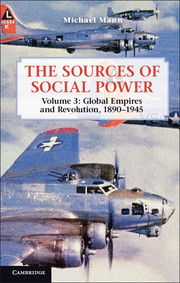Book contents
- Frontmatter
- Contents
- Preface
- 1 Introduction
- 2 Globalization imperially fractured
- 3 America and its empire in the Progressive Era, 1890–1930
- 4 Asian empires
- 5 Half-global crisis
- 6 Explaining revolutions
- 7 A half-global crisis
- 8 The new deal
- 9 The development of social citizenship in capitalist democracies
- 10 The Fascist alternative, 1918–1945
- 11 The Soviet alternative, 1918–1945
- 12 Japanese imperialism, 1930–1945
- 13 Explaining the Chinese revolution
- 14 The last interimperial war, 1939–1945
- 15 Conclusion
- Bibliography
- Index
15 - Conclusion
Published online by Cambridge University Press: 05 November 2012
- Frontmatter
- Contents
- Preface
- 1 Introduction
- 2 Globalization imperially fractured
- 3 America and its empire in the Progressive Era, 1890–1930
- 4 Asian empires
- 5 Half-global crisis
- 6 Explaining revolutions
- 7 A half-global crisis
- 8 The new deal
- 9 The development of social citizenship in capitalist democracies
- 10 The Fascist alternative, 1918–1945
- 11 The Soviet alternative, 1918–1945
- 12 Japanese imperialism, 1930–1945
- 13 Explaining the Chinese revolution
- 14 The last interimperial war, 1939–1945
- 15 Conclusion
- Bibliography
- Index
Summary
I leave theoretical conclusions to my fourth volume, although it is already obvious that to understand the development of modern societies we must give broadly equal attention to the causal power and interrelations of all four sources of social power: ideological, economic, military, and political. This was very evident in this period, with its intensifying ideological struggles between democratic capitalism, communism, and fascism, and its self-destructive racism; its capitalism whose powers of both creation and destruction had never been higher; its two devastating near-global wars and the global threat of the atom bomb; and its intensifying nation-states and global empires. It is unlikely any one of these could be primary.
In a varied world, generalizations are hazardous. Each macro-region, each country, each region within countries, was different in one way or another, and this obviously reduced the homogenizing effect of globalizations. All countries are exceptional in the sense often used by Americans to refer to their own country. The myth of a unique American exceptionalism is deeply entrenched in American nationalism and politician’s rhetoric – but it is false. The United States’ principle exception in this period was that it suffered from serious white racism at home, whereas other Western countries had racism in their colonies. The United States was not unique in having almost no socialism, as the other Anglo countries did not either. Although the United States initially lagged in some aspects of social citizenship (but not in educational rights or progressive taxation), it caught up in the New Deal. I have noted country differences where these had important consequences, as American racism did, but for the most part, national peculiarities have served to reduce what might otherwise be seen as universal causes and effects into mere tendencies.
- Type
- Chapter
- Information
- The Sources of Social Power , pp. 457 - 466Publisher: Cambridge University PressPrint publication year: 2012



